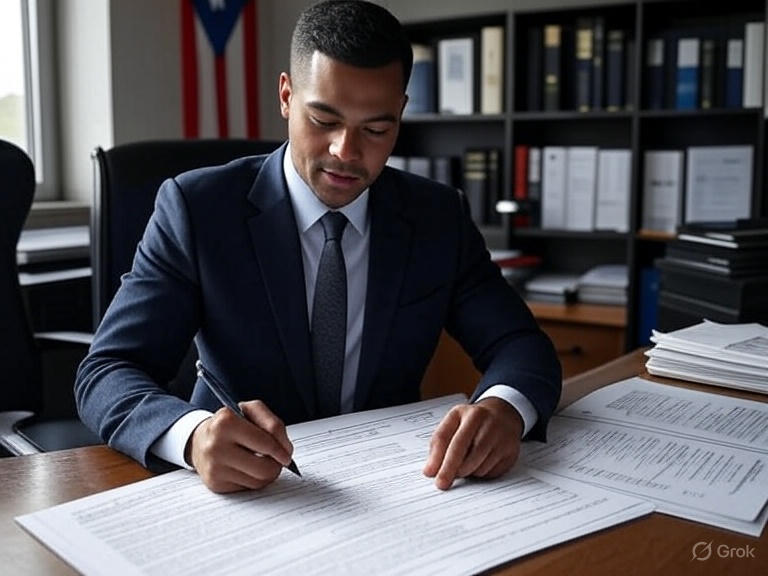Personal History Form for a Puerto Rico IFE
International Financial Entities (IFEs) in Puerto Rico operate under a specialized regulatory framework designed to attract global financial services while ensuring transparency, compliance, and integrity. A key component of the application or appointment process for directors, officers, managers, members, and owners of an IFE is the Statement of Personal History Form. This document, mandated by the Commissioner of Financial Institutions of Puerto Rico, serves as a comprehensive disclosure tool to verify the suitability of individuals involved in these entities. Below, we’ll summarize the form’s structure, purpose, and the critical information required, drawing from the latest fillable version (updated as of July 2024, with a 2025 edition available here).
Purpose of the Form
The form is an official, sworn statement that must be completed by new directors (including independent ones), officers (or those in similar roles, such as compliance officers), and owners or controllers of an IFE. It applies to anyone who possesses or intends to possess, directly or indirectly, any interest in the entity’s capital. The primary goal is to provide a detailed personal and professional background, enabling regulators to assess potential risks, conflicts of interest, or disqualifying factors. Misrepresentation or omission of information can lead to denial or revocation of appointments. The form must be notarized, and if done outside the U.S., it requires an Apostille. Importantly, it cannot be altered without prior authorization.
Failure to fully disclose information—such as incomplete lists of business entities or financial assets—can raise doubts about the form’s accuracy, potentially derailing the entire application. Total transparency is non-negotiable, as regulators emphasize complete disclosure to maintain the integrity of Puerto Rico’s financial sector.
Key Sections and Required Information
The form is structured across multiple pages, starting with instructions and progressing through personal details, education, and beyond (though some versions may be truncated in previews, the full document typically spans 10 pages). Respondents must answer every question; if something doesn’t apply, mark it as “N/A.” Insufficient space requires attachments labeled as exhibits. Here’s a breakdown of the main sections based on the standard structure:
1. Personal Information
This foundational section collects basic biographical data to establish identity and background:
- Full Name and Identifiers: Provide your complete name (including middle name), Social Security Number, place and date of birth (month/day/year), nationality, and passport number.
- Civil Status and Contact Details: Include marital status, business and residence addresses (with phone numbers), and email address.
- Previous Residences: List addresses and dates for the last two residences.
- Occupation and Role in the IFE: Describe your current profession or occupation. Specify the position you’ll hold in the IFE (e.g., Director, Partner, Manager, Officer, Stockholder) and estimate monthly hours devoted to it.
- Ownership Details: Indicate if you’ll own stocks, participations, or any capital interest in the IFE. If yes, state the amount and percentage.
- Agreements for Additional Interest: Disclose any written or verbal agreements to acquire more interest in the IFE, with full details on a separate sheet if applicable.
This section ensures regulators can verify identity and assess commitment levels.
2. Education
Education and specialized training are scrutinized to confirm qualifications for financial roles:
- Formal Education: List schools, universities, or professional colleges attended, including locations, graduation dates, and degrees obtained. Use a table format if needed for clarity.
- Specialized Training and Licenses: Detail any training in banking, securities, investments, finance, or BSA/AML (Bank Secrecy Act/Anti-Money Laundering). Include active licenses (e.g., CPA, Attorney, Broker). For those with FINRA Series exams and approved registrations, provide proof of active status with the relevant regulator.
This helps evaluate expertise in regulated fields.
Additional Requirements Beyond the Core Form
While the form itself focuses on personal and educational history, the broader IFE application process mandates supplementary disclosures and verifications. These are often submitted alongside the form and are critical for approval:
- Financial Statements: Both personal and corporate financial statements must be reviewed and audited according to GAAP (Generally Accepted Accounting Principles) standards. This ensures standardized, reliable reporting of assets, liabilities, and financial health. Omissions here can invalidate the submission.
- Complete List of Business Entities: Provide an exhaustive list of all business entities in which you have an interest, including past and present roles. Failure to include even one entity—whether intentional or oversight—can cast doubt on the form’s accuracy. Regulators view this as a red flag, emphasizing that total disclosure is required to avoid perceptions of concealment.
- Financial Assets Disclosure: Similarly, all financial assets must be fully listed without exceptions. Incomplete reporting here mirrors the risks with business entities, potentially leading to rejection due to perceived inaccuracies.
- Third-Party Background Checks: All officers, directors, shareholders, investors, and individuals named in the business plan must undergo independent background checks. These must cover every country where the person has lived or operated a business in the last 10 years. This multi-jurisdictional approach ensures a thorough vetting for criminal, financial, or regulatory issues.
Subsequent sections of the full form (often pages 5–10) typically delve into employment history, references, litigation involvement, regulatory actions, and financial net worth statements. Attachments for these are common, and all must align with the sworn nature of the document.
Tips for Completion and Submission
- Accuracy and Completeness: Double-check for omissions. Use separate sheets for expansions, clearly referencing the question.
- Notarization and Apostille: Ensure proper authentication, especially for international submissions.
- Supporting Documents: Prepare GAAP-compliant financials, proof of licenses, and background check reports in advance.
- Consequences of Errors: As an official document, inaccuracies can result in severe penalties, including license denial.
In summary, the Personal History Form is a gateway to trust in Puerto Rico’s IFE ecosystem. It demands meticulous detail to demonstrate fitness for financial roles, with no room for shortcuts. For the most current version, refer to the linked fillable PDF. Consulting legal or financial experts familiar with Puerto Rican regulations is advisable to navigate this process successfully.

